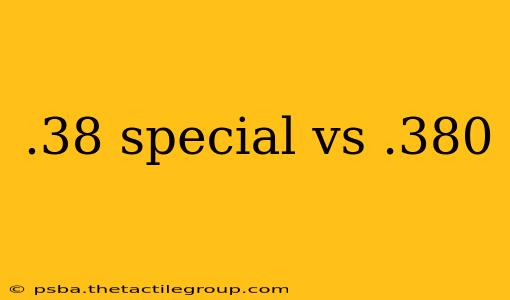Choosing the right cartridge for self-defense or target shooting can be a daunting task, especially when comparing similar calibers like the .38 Special and the .380 ACP (Automatic Colt Pistol). While both are relatively common and readily available, they possess distinct characteristics that make them suitable for different purposes and users. This detailed comparison will explore the key differences between the .38 Special and .380 ACP, helping you make an informed decision based on your specific needs.
Caliber, Size, and Power: Understanding the Fundamentals
The most significant difference lies in their power and size. The .38 Special is a significantly more powerful round. It's a larger cartridge, generally firing heavier bullets at higher velocities, resulting in substantially greater stopping power. The .380 ACP, on the other hand, is a smaller, lower-powered cartridge designed primarily for concealed carry and personal defense where size and ease of handling are paramount.
Bullet Weight and Velocity: A Closer Look
The .38 Special typically fires bullets ranging from 110 to 158 grains, with velocities ranging from 755 to 1000 feet per second (fps), depending on the load. The .380 ACP, conversely, usually fires lighter bullets (90-100 grains) at lower velocities (800-1000 fps). This difference in weight and velocity directly impacts recoil and muzzle energy.
Recoil: Managing the Force
The .38 Special's greater power translates to more noticeable recoil. This can be beneficial for experienced shooters who prefer a more substantial feel, but it can also be a deterrent for smaller-framed individuals or those new to firearms. The .380 ACP's lighter recoil makes it easier to control and shoot accurately, particularly in rapid succession.
Applications: Self-Defense vs. Target Shooting
The application you intend for the firearm significantly influences which caliber is more appropriate.
Self-Defense Considerations:
- .38 Special: Offers greater stopping power, making it a more effective choice for self-defense against a serious threat. However, its increased recoil may affect accuracy under stress.
- .380 ACP: Its smaller size and lighter recoil make it ideal for concealed carry, allowing for easier concealment and more comfortable handling. The reduced power, however, demands more precise shot placement for effective self-defense.
Target Shooting:
Both calibers are suitable for target practice, offering different experiences. The .38 Special provides a more substantial recoil, which some target shooters find preferable for developing shooting skills. The .380 ACP is a more economical option, especially for high-volume practice.
Availability and Cost: Practical Considerations
Both calibers are widely available, with ammunition readily found at most sporting goods stores and online retailers. However, the .380 ACP generally tends to be slightly more affordable, though prices fluctuate depending on market conditions.
Conclusion: Making the Right Choice
The best cartridge depends entirely on individual needs and preferences. The .38 Special excels in stopping power and is suitable for experienced shooters prioritizing effective self-defense, potentially with heavier recoil. The .380 ACP, with its smaller size and reduced recoil, shines for concealed carry and those seeking easier handling, although this comes with a trade-off in stopping power. Thorough research, potential range time with both calibers, and consultation with a firearms expert are recommended before making a final decision.

